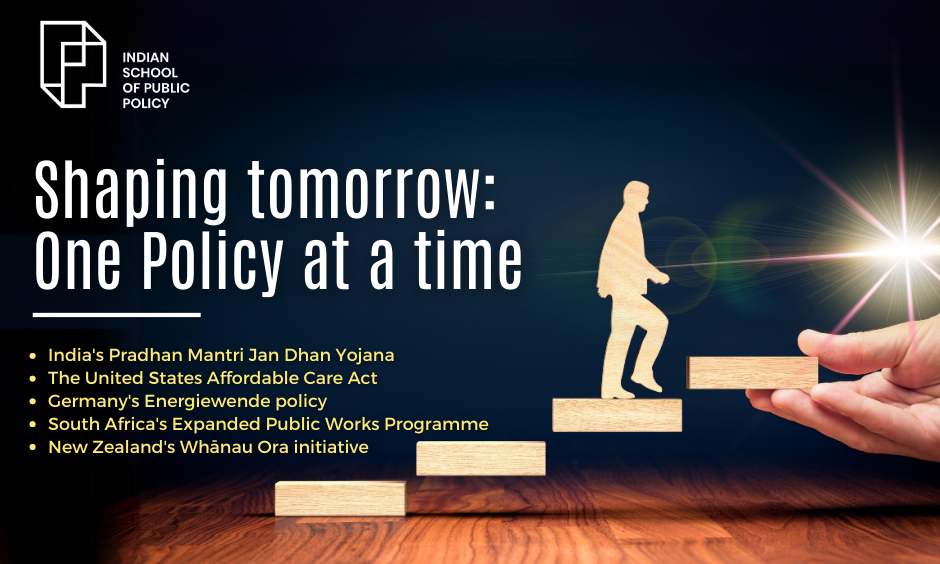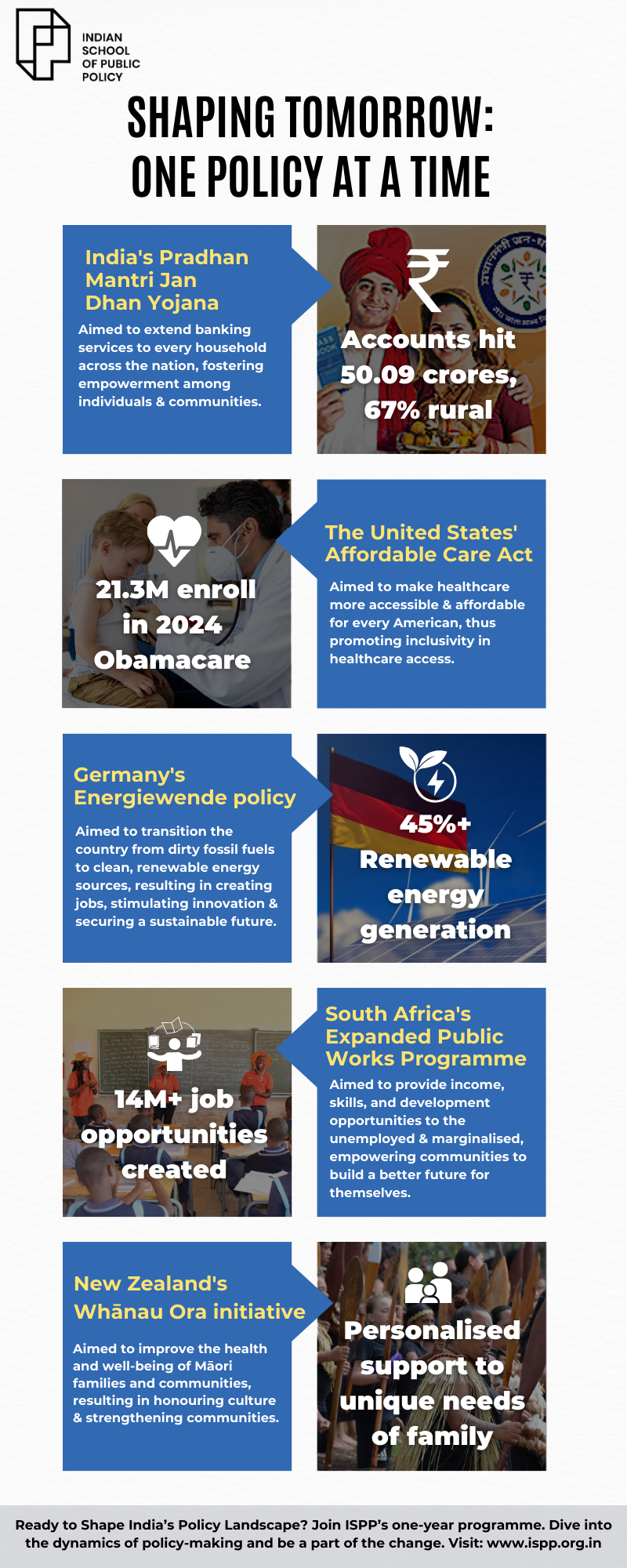
Shaping tomorrow: One Policy at a time

Public policy initiatives around the world have significantly impacted the lives of millions, addressing the needs of marginalised communities and fostering inclusive development. In a world brimming with challenges, public policy emerges as a guiding light, illuminating pathways towards progress and inclusivity. Let’s embark on a journey across continents, exploring the impactful public policy initiatives that have reshaped lives and communities.
India’s Pradhan Mantri Jan Dhan Yojana (PMJDY):
Imagine residing in a village devoid of banks, ATMs, and avenues for future savings. This was the reality for millions of Indians until the advent of PMJDY in 2014. This pioneering initiative aimed to extend banking services to every household across the nation. Within a short span, over 40 crore bank accounts were established, predominantly in rural regions. Suddenly, individuals found themselves equipped to amass savings, access credit, and secure their families through insurance coverage. PMJDY transcended mere banking; it fostered empowerment among individuals and communities, granting them a pathway to financial independence. Over the years, the Jan Dhan scheme has witnessed remarkable success, with the total number of accounts surging to 50.09 crores in 2023 from 14.72 crores in March 2015, with 67 percent of these accounts initiated in rural and semi-urban areas nationwide.
The United States’ Affordable Care Act (ACA):
Healthcare shouldn’t be a luxury; it should be a basic human right. That’s the principle behind the Affordable Care Act, affectionately known as Obamacare. Enacted in 2010, the ACA aimed to make healthcare more accessible and affordable for every American. It ensures families that they won’t face financial ruin in the event of illness, offering them a sense of security and peace of mind. The ACA focused on creating equality by ensuring that everyone, regardless of their financial situation or health history, had the opportunity to live a healthy life, thus levelling the playing field and promoting inclusivity in healthcare access. A new milestone has been reached as 21.3 million Americans have enrolled in Obamacare health insurance for 2024, marking a significant 31% increase from the previous year and the highest enrollment recorded since the program’s establishment, according to the U.S. government.
Germany’s Energiewende policy:
Climate change is the greatest challenge of our time, and Germany has taken it head-on with its Energiewende policy. This bold initiative aimed to transition the country from dirty fossil fuels to clean, renewable energy sources. Through measures like feed-in tariffs and grid modernisation, Germany became a global leader in renewable energy. But Energiewende wasn’t just about saving the planet; it was about creating jobs, stimulating innovation, and securing a sustainable future for generations to come. According to recent reports, Germany now generates over 45% of its electricity from renewable sources, with the Energiewende creating over 300,000 jobs and driving down carbon emissions significantly.
South Africa’s Expanded Public Works Programme (EPWP):
Unemployment isn’t just a statistic; it’s a harsh reality for millions of South Africans, especially those in rural areas. That’s where the Expanded Public Works Programme comes in. Launched in 2004, EPWP aimed to provide income, skills, and development opportunities to the unemployed and marginalised. And it worked! Through projects in infrastructure, social services, and the arts, EPWP created millions of jobs and empowered communities to build a better future for themselves. By March 2023, the programme had steadily created over 14 million work opportunities since its inception in April 2004. However, EPWP wasn’t just about employment; it was about restoring dignity and hope to those who had been left behind by society.
New Zealand’s Whānau Ora initiative:
Family is the cornerstone of any society, and New Zealand recognised that with its Whānau Ora initiative. Launched in 2010, Whānau Ora aimed to improve the health and well-being of Māori families and communities. By providing personalised support and services tailored to the unique needs of each family, Whānau Ora empowered Māori families to take control of their futures. But Whānau Ora wasn’t just about services; it was about honouring culture, strengthening communities, and ensuring that every family had the opportunity to thrive. According to recent evaluations, Whānau Ora has led to improvements in health outcomes, education attainment, and economic empowerment for Māori families, with a significant reduction in health disparities and social inequalities.
These examples remind us that public policy isn’t just about laws and regulations; it’s about people. It’s about giving everyone a fair shot at success and creating a world where everyone can live with dignity and respect. Celebrating these initiatives is not just about acknowledging their achievements but also recognising the values they represent: compassion, solidarity, and a belief in the inherent worth of every human being. It’s about honouring the individuals whose lives have been transformed by these policies and advocating for continued progress towards a brighter, more inclusive future. As we reflect on these examples, let’s reaffirm our commitment to advancing public policies that prioritise the well-being and dignity of all citizens.
To effectively address policy challenges on a global scale, aspiring individuals must equip themselves with the requisite skills and expertise. This entails proficiency in diverse areas such as design thinking, behavioural change strategies, and adept handling of varied stakeholder interests. Additionally, proficiency in data analysis is indispensable for formulating policies that are both impactful and evidence-based. Thus, it is imperative for the next generation of policymakers to diligently cultivate these skills to navigate and contribute effectively to the complex landscape of policy formulation and implementation.
Infographics


Diksha Agrawal
Programme Advisor – Admissions
Diksha Agrawal, a Sociology graduate from Miranda House and postgraduate from Delhi School of Economics, embarked on her professional journey as a research fellow for Prashant Kishore’s Jan Suraaj initiative. Traveling across various districts of Bihar, she gained profound insights into the diverse needs of communities, igniting a deep interest in the field of public policy.
Furthering her engagement in politics and governance, Diksha served as a consultant for Inclusive Minds, political consultancy working for Indian National Congress during the Chhattisgarh elections. This role provided her with invaluable insights into the socio-political landscape of the state, reinforcing her determination to drive positive change through effective policy formulation and implementation.


